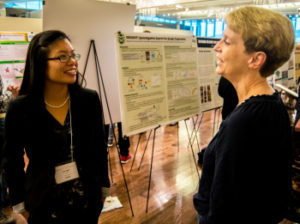Amy Huff, a master’s student in the School of Education’s Counseling and Career Development specialization, was one of eight graduate students representing the School of Education at Colorado State University’s Graduate Student Showcase on Nov. 15.
Her research proposal, “Maintaining Eligibility Versus Career Development: Exploring Coaches’ Impact on Student-Athletes,” stemmed from a graduate research course Huff took during the 2016 summer semester. “I went into the course planning to just get it over with, since I never considered research to be of interest to me,” says Huff. “When I found out we had to write a research proposal, I knew I had to choose something that would interest me.”
 Huff entered the Counseling and Career Development program with an interest in working with student-athletes in counseling and, more particularly, in the realm of career development. As an athlete, and as a swim coach, she encounters a number of Division 1 athletes who struggle with the transition from being a student-athlete to finding their place in a life and career outside their sport. Through her research of current literature, Huff discovered, among many others, the following three principles:
Huff entered the Counseling and Career Development program with an interest in working with student-athletes in counseling and, more particularly, in the realm of career development. As an athlete, and as a swim coach, she encounters a number of Division 1 athletes who struggle with the transition from being a student-athlete to finding their place in a life and career outside their sport. Through her research of current literature, Huff discovered, among many others, the following three principles:
• Many student-athletes are encouraged to adjust their courses and even change their major to better work with their practice schedules.
• Research has shown that college is a crucial time of identity and career development experiences. When a student-athlete more strongly identifies with their athletic role over their student role, they miss out on these key experiences.
• Student-athletes struggle with being incorporated into the rest of the student body; this means they are missing out on learning to work with people from a variety of backgrounds, upbringings and cultures.
At certain universities, some programs have been created to increase collaboration between the athletic department and the campus career center. Such programs offer career development workshops and presentations by local industry speakers, and encourage career exploration; however, Huff saw a gap in the research concerning the role of coaches in student-athlete career development. Would a Division 1 coach allow time to their athletes to participate in these types of workshops? What impact would the coach have if they cared for their student-athletes as a whole person, with a life and future that may be outside of their sport? Since less than 3 percent of student-athletes in America become professional athletes, this is a valid consideration.
At the Graduate Student Showcase, Huff presented her research proposal to students, parents, faculty and judges. “It was really interesting to me to be able to present this to a variety of people, without knowing their backgrounds,” she said. “It broadened my perspective and helped validate the need to carry out this research.”
Huff found the experience of presenting alongside her peers to be a valuable experience. “It was so inspiring to be in a room of 343 other students who were also given the opportunity to present what they are so passionate about,” she said. “It was amazing to walk around the room and see the depth of what is being researched and studied on my campus.”
Huff is planning to continue her research during in the following year, looking forward to bringing much-needed attention to this particular group of students on campuses across the United States. She hopes her findings have an impact on university athletic administrations, communities surrounding and supporting university athletics programs, coaches and athletic advisors, and most importantly, the lives of student-athletes.